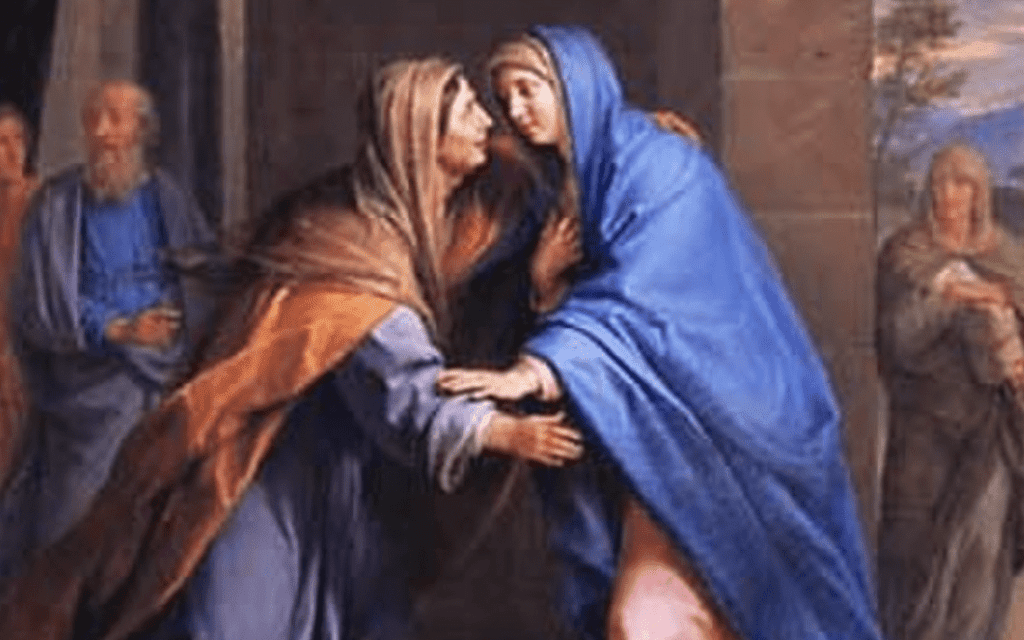The Visitation as “Paying it forward”
There is no doubt about Mary’s place in our history, the story of salvation.
We celebrate her conception, birth, presentation, annunciation, visitation, motherhood, sorrow, immaculate heart, assumption into and queenship in heaven, and her intercessory power through the rosary.
In all, there are more than 17 feasts and memorials, two months of popular devotions. May and October, and countless prayers and novenas devoted to Mary throughout the year.
That’s a lot of celebrating! But all these celebrations can blind us to some forgotten truths.

Sometimes we forget Mary’s roots
Before she became the mother of Jesus she was
- a young girl probably about 13-14,
- poor,
- steeped in the ordinary piety of her day,
- praying for the Messiah who would deliver her and her people,
- faithful to the 613 laws of the Torah,
- committed to a marriage her parents arranged.
We keep forgetting … she was simply a faithful member of an ordinary community trying to find her way through the normal difficulties of life.
In this, she is very much our sister. Her experience is very much like our own.
She was not unlike so many women in thousands of villages as they exist today in ghettos and poor neighborhoods on all continents today Her daily life and labor were hard.
With Joseph, she raised Jesus in oppressive circumstances, struggling to pay the taxes by which the rich became richer at the expense of the poor. As with most people in world history, most of Mary’s difficult life went unrecorded. We fill in the blanks.
Her story was interwoven with many stories
Annunciation as a surprising challenge
Hers is the story of a great gift. But I fear we risk missing the point by focusing on the gift of being the mother of God.
She was surely startled at the Annunciation. Yet, she models for us what it means to be a believer in the most confusing of times.
In her response, she was just being faithful to what God was asking even if she did not understand why or how.
Visitation as “Paying it forward”
On the surface, we see two pregnant women doing what they naturally do – sharing the wonder of pregnancy and mutually supporting each other.
But there is a deeper level – the level of “paying it forward”.
Many may remember a movie in 2000 called “Pay It Forward.” The lead line in the movie was, “When someone does you a good deed, don’t pay it back, pay it forward.”
God has given her the greatest gift imaginable by visiting her both in the visit of the angel, but also “overshadowing” her in the depth of her being.
In her visitation journey to Elizabeth, Mary was simply “paying her gift forward” by offering her elderly cousin much welcomed assistance.
Intersections with our stories… your story
Remembering her background, we see her experience is very much like our own. What she did in a literal way — carrying and making God present in history — we are also supposed to do in our own lives.
There are two things about Mary’s visitation each and every one of us can do.
In the annunciation of our Baptism, we are challenged to be Christ-bearers, to be Christ in the midst of our ordinary lives.
Her visitation challenges us to “pay it forward.” We “pay it forward” when we journey out of ourselves to visit and encounter our neighbor, especially when they are foreigners or different from ourselves.
Isn’t this what Pope Francis has in mind when he asks the whole church to visit and encounter one another.
Do we recognize and rejoice in the “annunciation” of our Baptism and accept the challenge to “pay it forward” in our daily encounters with others?
Originally posted on Vincentian Mindwalk
Tags: John Freund







0 Comments